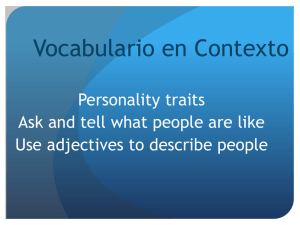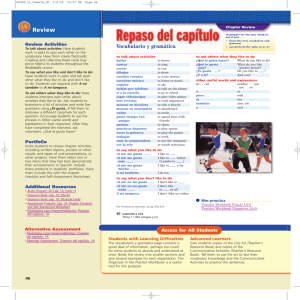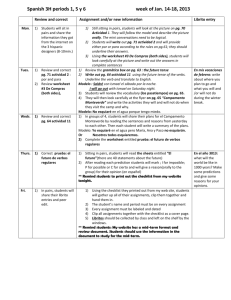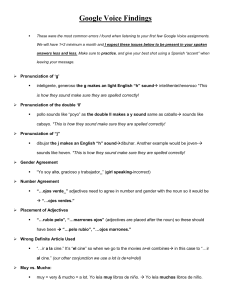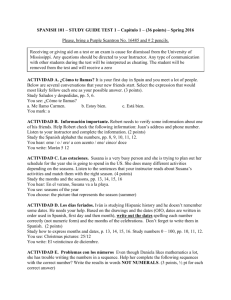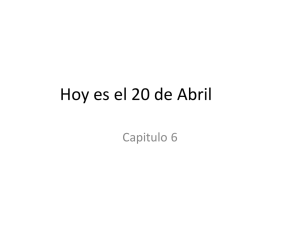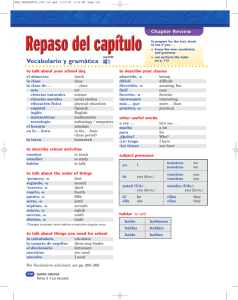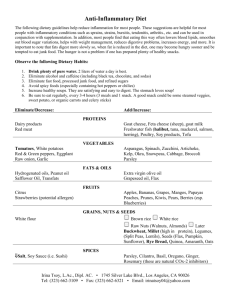Review - cibacs
advertisement
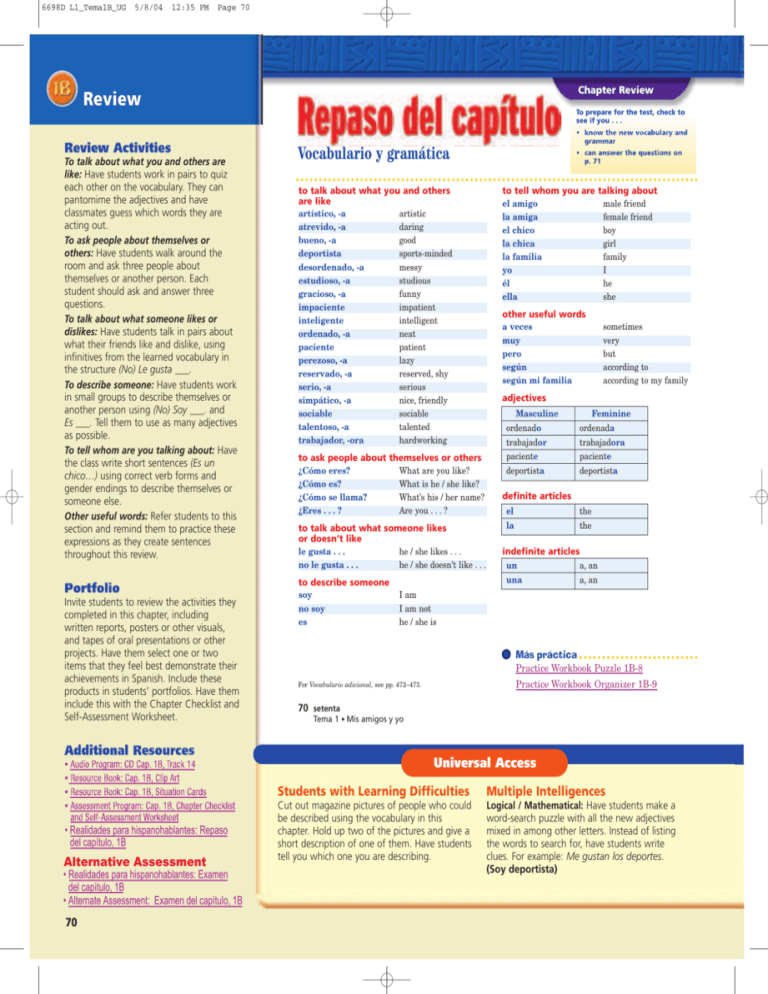
6698D L1_Tema1B_UG 5/8/04 12:35 PM Page 70 Chapter Review Review Review Activities To talk about what you and others are like: Have students work in pairs to quiz each other on the vocabulary. They can pantomime the adjectives and have classmates guess which words they are acting out. To ask people about themselves or others: Have students walk around the room and ask three people about themselves or another person. Each student should ask and answer three questions. To talk about what someone likes or dislikes: Have students talk in pairs about what their friends like and dislike, using infinitives from the learned vocabulary in the structure (No) Le gusta ___. To describe someone: Have students work in small groups to describe themselves or another person using (No) Soy ___. and Es ___. Tell them to use as many adjectives as possible. To tell whom are you talking about: Have the class write short sentences (Es un chico…) using correct verb forms and gender endings to describe themselves or someone else. Other useful words: Refer students to this section and remind them to practice these expressions as they create sentences throughout this review. Portfolio Invite students to review the activities they completed in this chapter, including written reports, posters or other visuals, and tapes of oral presentations or other projects. Have them select one or two items that they feel best demonstrate their achievements in Spanish. Include these products in students’ portfolios. Have them include this with the Chapter Checklist and Self-Assessment Worksheet. Additional Resources Audio Program: CD Cap. 1B, Track 14 Resource Book: Cap. 1B, Clip Art • Resource Book: Cap. 1B, Situation Cards • Assessment Program: Cap. 1B, Chapter Checklist and Self-Assessment Worksheet • To prepare for the test, check to see if you . . . • know the new vocabulary and grammar Vocabulario y gramática to talk about what you and others are like artístico, -a artistic atrevido, -a daring bueno, -a good deportista sports-minded desordenado, -a messy estudioso, -a studious gracioso, -a funny impaciente impatient inteligente intelligent ordenado, -a neat paciente patient perezoso, -a lazy reservado, -a reserved, shy serio, -a serious simpático, -a nice, friendly sociable sociable talentoso, -a talented trabajador, -ora hardworking to ask people about themselves or others ¿Cómo eres? What are you like? ¿Cómo es? What is he / she like? ¿Cómo se llama? What’s his / her name? ¿Eres . . . ? Are you . . . ? to talk about what someone likes or doesn’t like le gusta . . . he / she likes . . . no le gusta . . . he / she doesn’t like . . . to describe someone soy no soy es • can answer the questions on p. 71 to tell whom you are talking about el amigo male friend la amiga female friend el chico boy la chica girl la familia family yo I él he ella she other useful words a veces muy pero según según mi familia sometimes very but according to according to my family adjectives Masculine ordenado Feminine ordenada trabajador trabajadora paciente paciente deportista deportista definite articles el the la the indefinite articles un a, an una a, an I am I am not he / she is Más práctica Practice Workbook Puzzle 1B-8 Practice Workbook Organizer 1B-9 For Vocabulario adicional, see pp. 472–473. 70 setenta Tema 1 • Mis amigos y yo Universal Access • • Realidades para hispanohablantes: Repaso del capítulo, 1B Alternative Assessment • Realidades para hispanohablantes: Examen del capítulo, 1B • Alternate Assessment: Examen del capítulo, 1B 70 Students with Learning Difficulties Multiple Intelligences Cut out magazine pictures of people who could be described using the vocabulary in this chapter. Hold up two of the pictures and give a short description of one of them. Have students tell you which one you are describing. Logical / Mathematical: Have students make a word-search puzzle with all the new adjectives mixed in among other letters. Instead of listing the words to search for, have students write clues. For example: Me gustan los deportes. (Soy deportista) 6698D L1_Tema1B_UG 5/8/04 12:35 PM Page 71 Review Preparación para el examen For: Test preparation Visit: www.phschool.com Web Code: jcd-0117 Performance Tasks Standards: 1.1, 1.2, 1.3, 2.1 On the exam you will be asked to . . . Here are practice tasks similar to those you will find on the exam . . . If you need review . . . 1 Escuchar Listen to and understand a description of a friend Listen as a character in a Spanish soap opera describes his ex-girlfriend. What does he think her good qualities are? What does he think her shortcomings are? Can you understand why he broke up with her? pp. 50–53 A primera vista p. 57 Actividades 11–12 p. 62 Actividad 20 2 Hablar Talk about yourself in terms of how you see yourself While you’re talking to your Spanish teacher, you realize that she doesn’t know the “real you.” Tell her some things about yourself that would help her understand you. pp. 50–53 A primera vista p. 56 Actividad 9 p. 57 Actividad 11 p. 58 Actividad 13 p. 63 Actividad 22 3 Leer Read and understand a description of someone In a popular Spanish magazine, you see an interview with the actor who plays the part of a teenager, Carlos, in a TV show you have been watching. See if you can understand what he is saying about the character he plays: pp. 50–53 A primera vista p. 59 Actividad 14 pp. 64–65 Lectura Elena is talented and intelligent, but very serious. Her shortcomings are that she is not sociable. He likes more outgoing or daring women. pp. 56–57 Actividades 10–12 p. 59 Actividad 15 p. 63 Actividad 22 p. 67 Presentación escrita 2. Hablar Suggestions: Tell students to use as many adjectives as they can. For more practice, have students describe themselves as the opposite of what they are like. Answers will vary. 3. Leer Suggestions: Remind students to look for cognates. Ask volunteers to point out the phrases that describe personality traits. Answers: The first issue of your school’s online newspaper is called “Getting to Know You.” Submit a brief profile of yourself. Mention what your family thinks of you and list some things you like to do. For example: Suggestions: Play the Audio CD or read the script. Have students suggest answers to the questions. Script: ¿Cómo es María Elena? Pues... es una chica inteligente y talentosa, pero es muuuy seria. Y no es sociable. Yo soy un chico gracioso y muy sociable. A mí me gustan más las chicas atrevidas. 1. Es ridículo. Es muy impaciente y perezoso. Él no es ni simpatico ni gracioso. 2. Él es muy inteligente, pero le gusta hablar y hablar de nada. Yo soy una chica deportista y muy sociable. Según mi familia, soy graciosa. Me gusta patinar y hablar por teléfono. 5 Pensar Demonstrate an understanding of cultural perspectives on friendship 15; Resource Book: Cap. 1B, Audio Script; Practice Answers on Transparencies 1. Escuchar Answers: ¡No me gusta nada el chico! Él es muy inteligente, pero le gusta hablar y hablar de NADA. Es ridículo. Es muy impaciente y perezoso. Él no es ni simpático ni gracioso. Yo soy un actor . . . ¡no soy como Carlos! 4 Escribir Write a short paragraph describing yourself Resources: Audio Program: CD Cap. 1B, Track Explain the differences between the terms amigo and conocido in Spanish-speaking cultures. How does this compare to words that we use in the United States? p. 66 Perspectivas del mundo hispano setenta y uno Capítulo 1B Enriching Your Teaching Teacher-to-Teacher Have students work in groups, pretending to be the teacher and students. The “teacher” will ask the students questions, focusing on vocabulary from this chapter. 71 4. Escribir Suggestions: Encourage students to be creative and imaginative. Tell them they can either describe themselves as they are, or write about a “person” they create as themselves. Answers will vary. 5. Pensar Suggestions: Allow students to speak spontaneously about the issue, speak from a short outline or list of their thoughts, or write a brief paragraph and discuss it using their notes. Answers will vary. Assessment Examen del capítulo: 1B • Audio Program: CD 20, Track 4 • Alternative Assessment ExamView Test Bank CD-ROM Resource Book: Cap. 1B, Situation Cards • Resource Book: Cap. 1B, Communicative Activities • • 71
